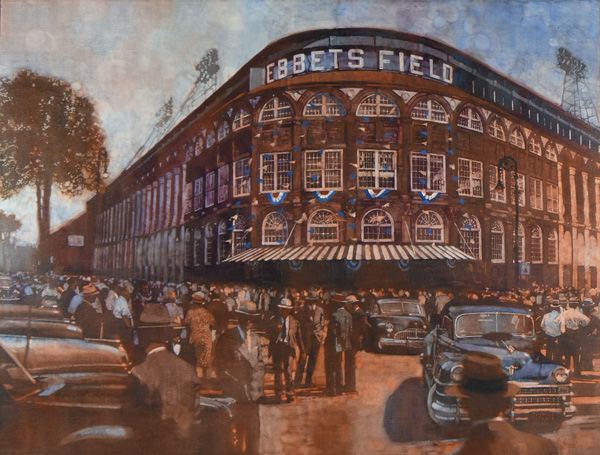"Ebbets Field" Lot no. 857
By Bernie Fuchs (1932 - 2009)
1975 (Estimated)
38.00" x 50.00"
Oil on Canvas
Signed Lower Right
REQUEST PRICE
PURCHASE REQUEST

A painting for a poster print.
Explore related art collections: Sports / Action / Automotive/Transport / Urban/Cities / Poster Illustrations / Advertisements / 1970s / $20,000 - $50,000 / Baseball
See all original artwork by Bernie Fuchs
ABOUT THE ARTIST
Washington Post Staff Writer
Saturday, September 19, 2009
Bernie Fuchs, 76, an illustrator whose influential work for magazines ranging from Cosmopolitan to Sports Illustrated seamlessly blended qualities of traditional narrative with hints of abstract composition, died of esophageal cancer Sept. 17 at a care facility in Fairfield, Conn. He lived in nearby Westport.
Mr. Fuchs was adept at balancing art and commerce. He met the needs of mass-circulation magazines accustomed to Norman Rockwell-style realism, but he injected a fresh vitality and impressionism that became hugely popular and transformed the illustration field. He even experimented with bold designs based on the abstract expressionism movement popularized by painters Jackson Pollock and Willem de Kooning.
One vivid example, commissioned by McCall's magazine in the late 1950s, was a portrait of two young couples relaxing in a small room after dinner. One man is lying on the ground, his head nestled on a woman's lap and smoking a cigarette as she strokes his hair.
While the image has the control and realism of Rockwell, it also has several more dynamic features taken from avant-garde techniques: the vigorous brush strokes; the tilted horizon that heightens a sense of drama; a lampshade in the foreground that appears slightly distorted; and, most strikingly, the placement of the couples in the distance instead of being the center of the picture.
"Bernie combined the best of both worlds," said illustrator Murray Tinkelman, who directs the University of Hartford's master of fine arts program and chairs the New York-based Society of Illustrators' hall of fame committee. "He became the most emulated and imitated illustrator in the field through the 1980s . . . when the vogue turned to more decorative, whimsical, punkier illustrations that were influenced by underground cartoons like those of Robert Crumb."
Mr. Fuchs entered the hall of fame in 1975. He was among the youngest inductees on a roster that includes Rockwell, N.C. Wyeth, Winslow Homer and John James Audubon.
Bernard Leo Fuchs was born Oct. 19, 1932, in the coal mining town of O'Fallon, Ill., and his father soon abandoned the family. As a young man, Mr. Fuchs enjoyed drawing characters from Walt Disney movies and "The Wizard of Oz," but his main interest became jazz trumpet.
He worked in a machine shop after high school, and the loss of three fingers from his right hand ended his musical ambitions. He enrolled in art school out of desperation, figuring it was his only career prospect.
The money he received from the accident paid for his art training at Washington University in St. Louis, where he graduated in 1954. About this time, he married his high school sweetheart, Anna Lee Hesse. She survives, living in Westport, along with their three children, Cynthia Fuchs of Washington, Derek Fuchs of Casselberry, Fla., and Ellise Fuchs of Torino, Italy; and three grandchildren.
After college, Mr. Fuchs went to work for a commercial art studio in Detroit and found immediate success drawing the latest car models for magazines, brochures and billboards. He captured the chrome-dappled allure of the auto industry: happy Americans enjoying themselves at picnics and on golf courses and accompanied by their elegant cars.
"Others might portray a married couple dressed formally in suits dazzled by a car on the street, or a woman in a fancy ball gown swooning over a car in a showroom, but Bernie's innovation was to put the cars in real life situations with people in all kinds of informal poses, having fun and even in some cases standing in front of the car (heresy!)," illustration authority David Apatoff wrote in an e-mail.
Several top corporations in America took note of Mr. Fuchs's skill. He relocated to suburban Connecticut in the late 1950s and became one of the busiest commercial artists of the next 20 years, working for businesses such as Coca-Cola and Seagram's, as well as magazines including TV Guide and Look.
For the publications, he created a range of illustrations, with scenes from romance fiction and images that conveyed the grit of athletes and the determination of presidents and civil rights leaders.
Mr. Fuchs often photographed his subjects and returned to his studio to turn the images into illustrations. He said his most challenging deadline story came in 1969, when Sports Illustrated assigned him to cover the Rose Bowl in Pasadena, Calif., and the Orange Bowl in Miami. He saw the Rose Bowl live, lurking on the sidelines with his camera, and watched the game in Miami on television. He finished six paintings in 36 consecutive hours of work.
In the course of a prolific career, he met many historic figures of his era, including President John F. Kennedy, baseball player Jackie Robinson, entertainers Frank Sinatra and Bob Hope, and cellist Pablo Casals, who, ailing at 93, nevertheless played a Bach cantata for Mr. Fuchs at the musician's villa in Puerto Rico.
Starting in the mid-1970s, Mr. Fuchs had contracts to illustrate postage stamps and children's books. His paintings, whose subjects ranged from images of the Old West to the Longchamps horse races in France, were exhibited in galleries worldwide. Jill Bossert, editor of Society of Illustrators books, once described Mr. Fuchs's skill: "His colors shine with the brilliance of stained glass as if lit from within. His equine pictures rival Degas."
http://projects.washingtonpost.com/index.html